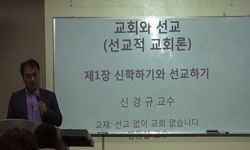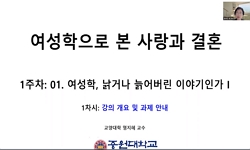이 논문은 루터의 선교 사상에 신학적 기초가 되는 ‘사랑으로 형성되는 믿음’(fides formata caritate)이라는 명제를 분석한다. 먼저 이 명제의 중세적 이해를 분석하여 루터가 어떻게 그 명제를...
http://chineseinput.net/에서 pinyin(병음)방식으로 중국어를 변환할 수 있습니다.
변환된 중국어를 복사하여 사용하시면 됩니다.
- 中文 을 입력하시려면 zhongwen을 입력하시고 space를누르시면됩니다.
- 北京 을 입력하시려면 beijing을 입력하시고 space를 누르시면 됩니다.
https://www.riss.kr/link?id=A60092787
- 저자
- 발행기관
- 학술지명
- 권호사항
-
발행연도
2008
-
작성언어
Korean
- 주제어
-
등재정보
KCI등재
-
자료형태
학술저널
-
수록면
41-67(27쪽)
-
KCI 피인용횟수
2
- 제공처
-
0
상세조회 -
0
다운로드
부가정보
국문 초록 (Abstract)
이 논문은 루터의 선교 사상에 신학적 기초가 되는 ‘사랑으로 형성되는 믿음’(fides formata caritate)이라는 명제를 분석한다. 먼저 이 명제의 중세적 이해를 분석하여 루터가 어떻게 그 명제를 극복하였는지 살펴보았고, 어거스틴에서 기초가 놓여진 중세 신학의 가장 든든한 이 명제가 루터의 성서 주석을 통하여 완전히 분쇄된 것을 명확히 보여 주고 있다. 불가타 역의 라틴어 표현을 넘어서 희랍어 중간태에 대한 정교한 이해가 이 논의의 핵심을 이루고 있는데, 루터는 이신칭의의 신학적 틀에 의하여 믿음으로 구원받은 자의 ‘사랑’이라는 관점에서 ‘사랑으로 역사하는 믿음’이라는 형태로 전환시켜 해석하고 있다. 더 나아가 이 논문에서는 루터가 직접적으로 말하지 않았지만, 그의 신학적 틀에서 생성될 수 있는 새로운 명제, 즉 ‘신의 사랑으로 형성되는 믿음’이라는 새로운 명제로 제시하고 있다. 이 명제는 인간의 믿음조차도 신의 사랑으로 인하여 그 가능성이 주어졌다고 하는 신학적 이해에서 비롯된 것이다. 신의 사랑이 모든 것에 우선하는 가능성이요 ‘시작의 시작’(the beginning of beginnings)이라면, 루터의 신학과 선교 그 첫 머리에는 그 어떤 것도 아닌 ‘신의 사랑’이 그 첫 머리에 정초해야 하는 것이다.
다국어 초록 (Multilingual Abstract)
The paper analyzes the theological proposition, fides formata caritate) which is the theological foundation of Luther’s missiology. By analyzing the medieval interpretations of this proposition, the paper demonstrates how Luther overcame the formida...
The paper analyzes the theological proposition, fides formata caritate) which is the theological foundation of Luther’s missiology. By analyzing the medieval interpretations of this proposition, the paper demonstrates how Luther overcame the formidable basis of the medieval theology through his careful exegetical interpretation of the New Testament. Luther firmly captured the grammatical significance of the middle tense of the New Testament Greek verb and its theological implication to the doctrine of justification by faith. Thereby Luther reinterpreted the medieval doctrine of fides formata caritate into “faith active in love,” which is derived from Luther’s theological new understanding of the divine love and its soteriological significance. In other words, even faith comes from the possibility of the divine love, not from human achievement. The divine love precedes everything. The divine love is the beginning of beginnings. Therefore, the divine love must be located in the very preface of Luther’ s theology and missiology.
목차 (Table of Contents)
- 논문 초록
- Ⅰ. 서론
- Ⅱ. 사랑으로 형성되는 믿음(fides formata caritate)
- Ⅲ. 사랑으로 역사하는 믿음(fides operatur caritate)
- Ⅳ. 신의 사랑으로 형성되는 마음 (fides formata Caritate Dei)
- 논문 초록
- Ⅰ. 서론
- Ⅱ. 사랑으로 형성되는 믿음(fides formata caritate)
- Ⅲ. 사랑으로 역사하는 믿음(fides operatur caritate)
- Ⅳ. 신의 사랑으로 형성되는 마음 (fides formata Caritate Dei)
- Ⅴ. 결론
- 참고 문헌
- Abstract
참고문헌 (Reference)
1 Aristotle, "The Nicomachean Ethics" Harvard University Press 1962
2 Ozment,Steven E, "The Age of Reform (1250-1550): An Intellectual and Religious History of Late Medieval and Reformation Europe" Yale University Press 1980
3 Raunio, Antti, "Summe Des Christlichen Lebens: Die “Goldene Regel” Als Gesetz Der Liebe in Der Theologie Martin Luthers Von 1510-1527" von Zabern 2001
4 Aquinas, Thomas, "Scriptum Super Libros Sententiarum Magistri Petri Lombardi Episcopi Parisiensis" Sumptibus P. Lethielleux 1929
5 Dorman, Ted, "Review of Union with Christ: The New Finnish Interpretation of Luther"
6 Lee, Jeha, "Luther’s Theology of Love in His Johannine Commentaries (1527), Paper presented at the Sixteenth Century Studies Conference" 2005
7 Hendrix, Scott H, "Luther’s Loyalties and the Augustinian Order In Augustine, the Harvest, and Theology (1300-1650): Essays Dedicated to Heiko Augustinus Oberman in Honor of His Sixtieth Birthday" E.J. Brill 1990
8 Spitz, Lewis William, "Luther and German Humanism" Brookfield, Variorum 1996
9 Peura, "Luther Und Theosis: Vergottlichung Als Thema Der Abendlandischen Theologie; Referate Der Fachtagung Der Luther-Akademie Ratzeburg in Helsinki 30"
10 Aquinas, Thomas, "Lectura in Omnes Epistolas Pauli Vol. 20, Opera Omnia" Vives 1876
1 Aristotle, "The Nicomachean Ethics" Harvard University Press 1962
2 Ozment,Steven E, "The Age of Reform (1250-1550): An Intellectual and Religious History of Late Medieval and Reformation Europe" Yale University Press 1980
3 Raunio, Antti, "Summe Des Christlichen Lebens: Die “Goldene Regel” Als Gesetz Der Liebe in Der Theologie Martin Luthers Von 1510-1527" von Zabern 2001
4 Aquinas, Thomas, "Scriptum Super Libros Sententiarum Magistri Petri Lombardi Episcopi Parisiensis" Sumptibus P. Lethielleux 1929
5 Dorman, Ted, "Review of Union with Christ: The New Finnish Interpretation of Luther"
6 Lee, Jeha, "Luther’s Theology of Love in His Johannine Commentaries (1527), Paper presented at the Sixteenth Century Studies Conference" 2005
7 Hendrix, Scott H, "Luther’s Loyalties and the Augustinian Order In Augustine, the Harvest, and Theology (1300-1650): Essays Dedicated to Heiko Augustinus Oberman in Honor of His Sixtieth Birthday" E.J. Brill 1990
8 Spitz, Lewis William, "Luther and German Humanism" Brookfield, Variorum 1996
9 Peura, "Luther Und Theosis: Vergottlichung Als Thema Der Abendlandischen Theologie; Referate Der Fachtagung Der Luther-Akademie Ratzeburg in Helsinki 30"
10 Aquinas, Thomas, "Lectura in Omnes Epistolas Pauli Vol. 20, Opera Omnia" Vives 1876
11 Carlson, Charles P, "Justification in Earlier Medieval Theology" Nijhoff 1975
12 Mannermaa, Tuomo, "Justification and Theosis in Lutheran-Orthodox Perspective, Union with Christ: The New Finnish Interpretation of Luther" William B.Eerdmans Publishing House 1998
13 Wallace,Daniel B, "Greek Grammar Beyond the Basics: An Exegetical Syntax of the New Testament Grand Rapids" Zondervan 1996
14 Saarinen, Risto, "Faith and Holiness: Lutheran-Orthodox Dialogue" Vandenhoeck & Ruprecht 1997
15 Forell,George Wolfgang, "Faith Active in Love: An Investigation of the Principles Underlying Luther’s Social Ethics" Augsburg Pub. House 1964
16 Mannermaa,Tuomo, "Der Im Glauben Gegenwartige Christus: Rechtfertigung Und Vergottung: Zum Okumenischen Dialog, Arbeiten Zur Geschichte Und Theologie Des Luthertums" Lutherisches Verlagshaus 1989
17 Mannermaa, Tuomo, "Der Im Glauben Gegenwartige Christus: Rechtfertigung Und Vergottung Zum Okumenischen Dialog, Arbeiten Zur Geschichte Und Theologie Des Luthertums" Lutherisches Verlagshaus 1989
18 Juntunen, Sammeli, "Der Begriff Des Nichts Bei Luther in Den Jahren Von 1510 Bis 1523, Schriften Der Luther-Agricola-Gesellschaft"
19 Augustine, "De Spiritu Et Littera" Clarendon Press 1914
20 Spicq, Ceslas, "Agape in the New Testament" B. Herder Book Co. 1963
21 Nygren,Anders, "Agape and Eros" Harper & Row 1969
22 Liddell, "A Greek-English Lexicon" Oxford University Press 1996
23 Lee, Jeha, "A Critique of Tuomo Mannermaa’s New Paradigm of Luther Research in Light of Martin Luther’s Concept of Love in His Commentary on the First Epistle of John (1527)" Boston University 2003
24 Burton, Ernst De Witt, "A Critical and Exegetical Commentary on the Epistle to the Galatians" Clark 1962
동일학술지(권/호) 다른 논문
-
- 장로회신학대학교 세계선교연구원
- 최윤배(Yoon Bae Choi)
- 2008
- KCI등재
-
- 장로회신학대학교 세계선교연구원
- 안신(Shin Ahn)
- 2008
- KCI등재
-
- 장로회신학대학교 세계선교연구원
- 황홍렬(Hong Eyoul Hwang)
- 2008
- KCI등재
-
- 장로회신학대학교 세계선교연구원
- 이종실(Jong Sil Lee)
- 2008
- KCI등재
분석정보
인용정보 인용지수 설명보기
학술지 이력
| 연월일 | 이력구분 | 이력상세 | 등재구분 |
|---|---|---|---|
| 2027 | 평가예정 | 재인증평가 신청대상 (재인증) | |
| 2021-01-01 | 평가 | 등재학술지 유지 (재인증) |  |
| 2018-01-01 | 평가 | 등재학술지 유지 (등재유지) |  |
| 2015-01-01 | 평가 | 등재학술지 유지 (등재유지) |  |
| 2011-01-01 | 평가 | 등재학술지 유지 (등재유지) |  |
| 2008-01-01 | 평가 | 등재학술지 선정 (등재후보2차) |  |
| 2007-01-01 | 평가 | 등재후보 1차 PASS (등재후보1차) |  |
| 2006-01-01 | 평가 | 신청제한 (등재후보2차) | |
| 2005-01-01 | 평가 | 등재후보 1차 PASS (등재후보1차) |  |
| 2004-01-01 | 평가 | 등재후보 1차 FAIL (등재후보1차) |  |
| 2002-01-01 | 평가 | 등재후보학술지 선정 (신규평가) |  |
학술지 인용정보
| 기준연도 | WOS-KCI 통합IF(2년) | KCIF(2년) | KCIF(3년) |
|---|---|---|---|
| 2016 | 1.35 | 1.35 | 1.11 |
| KCIF(4년) | KCIF(5년) | 중심성지수(3년) | 즉시성지수 |
| 1.1 | 0.96 | 1.006 | 0.26 |




 eArticle
eArticle DBpia
DBpia






